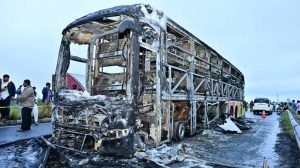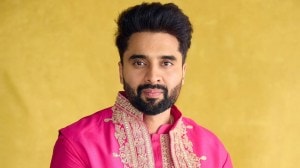AIDS patients turn pariahs
VADODARA, Sept 20: "Tame badha nalayak chho, ek laafo mari dayees. (you are a shame to society. I feel like slapping you)." Six...

VADODARA, Sept 20: "Tame badha nalayak chho, ek laafo mari dayees. (you are a shame to society. I feel like slapping you)." Sixty-year-old Anil Shah wails like a child when talking to this reporter. His emotions, though misdirected, are not unjustified: His daughter, Rita, and grandson Harsh have both tested positive for Human Immuno-deficiency Virus (HIV). His son-in-law Rajeshwar died of full-blown AIDS about months ago.
“When none of you could help at a time when we direly needed it, what is the purpose of our talking?”, he asks. There are no answers for him, nor can there be.
There are many other questions left unanswered. For example, ask Rita’s son Harsh why they were forced to shift from their Raopura flat. Or why their relatives don’t visit them any more (or don’t even phone anymore). Or why, when she went to her late husband’s office to collect his dues, no one would talk to her or look at her.
So many questions, just one answer: The social stigma of AIDS. It affects the 1,000-odd full-blown AIDS patients in Vadodara, as well as about 5,000 HIV carriers. It stems from the public, from the doctors, from everyone in society.
Yes, doctors too. The hostility can be direct, but is usually subtle. It could be a brush-off or `friendly’ advice to stay at home. In Patel’s case, after a family doctor noticed the symptoms and tests at SSG Hospital confirmed it, the `news’ spread like wildfire. He was advised `rest’, and that was the end of that.
It’s usually the scene at all hospitals, private or government, big or small. The Dark Ages all over again, with AIDS patients being given the sort of treatment handed out to lepers so many years ago. “Even the doctor’s behaviour changes. The nurses, who think they are most vulnerable, immediately inform other patients about the disease and all of them ensure we are ostracised within the nursing home or the hospital”, says Dipesh Bhavsar, another patient.
Yet another myth exploded is that of immediate death on testing HIV positive. “Any infected adult can live a quality life for more than a decade or even two”, says Bhardwaj Desai, oncohematologist. The infection starts by entering the lymphocytes (the body’s `defence army’ of white cells) after invading CD4 cell groups. Other non-infected cells fight against this and are capable of preventing the spread of infected cells. “This fight lasts for fairly a very long time — usually over 10 years. Full-blown AIDS usually occurs when the HIV brings the CD4 count down from 1500 to less than 500; that’s when it hurts”.
Well, that’s just half the story. For, no matter how positive the attitude, nothing works as well as proper medical treatment. And that’s where Vadodara seems to fall behind. The SSG Hospital does carry out dot-comb, Elisa and Western Blot tests, free of charge, but not on the general public, only on those already admitted. Neither does the hospital have anything to offer by way of isolation wards or antibiotic therapy. Why talk of SSG alone, you could include any of the private and trust hospitals in Vadodara.
Scoff if you will and say that it really doesn’t matter, that AIDS isn’t that hot an issue in Vadodara. That’s where you could be very wrong. Vadodara is in the grip of the third and final stage of this epidemic. In late 1980s, only a handful of prostitutes and truckers had HIV; the second phase came when spouses got it; the third, most tragic — and also most damaging — phase is when succeeding generations are affected.
The main problem, obviously, is lack of funds. Despite its size and importance, Vadodara receives just Rs 1 lakh from the government every year to tackle AIDS. As District Collector Anil Mukim — who heads, ex-officio, the District AIDS Control Society — admits, a comprehensive action plan is yet to be initiated by the administration and NGOs.
And that’s where the story ends for you and me, until it hits closer home. Which could happen any day.
Names of patients and their relatives have been changed to protect identity.






- 01
- 02
- 03
- 04
- 05

























